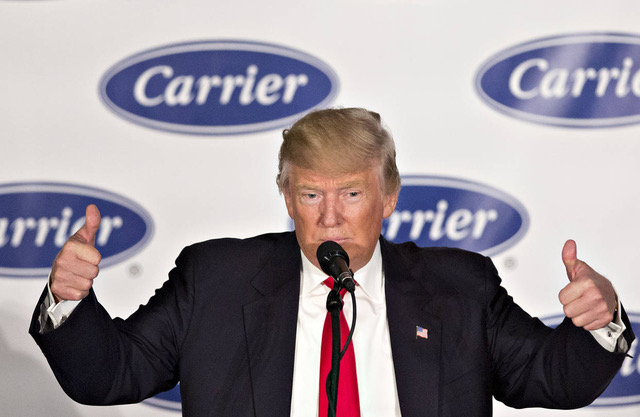WSJ: Why the White House Worries About Trade Deficits – Navarro – WSJ
Why the White House Worries About Trade Deficits
An imbalance imperils economic growth—and could put U.S. national security in jeopardy.
By Peter Navarro
Updated March 5, 2017 6:21 p.m. ET
The then-president-elect speaking at Carrier Corp. in Indianapolis, Dec. 1, 2016. Photo: Bloomberg News
Do trade deficits matter? The question is important because America’s trade deficit in goods is large and persistent, about $2 billion every day.
The economic argument that trade deficits matter begins with the observation that growth in real GDP depends on only four factors: consumption, government spending, business investment and net exports (the difference between exports and imports). Reducing a trade deficit through tough, smart negotiations is a way to increase net exports—and boost the rate of economic growth.
Suppose America successfully negotiates a bilateral trade deal this year with Mexico in which Mexico agrees to buy more products from the U.S. that it now purchases from the rest of the world. This would show up in government data as an increase in U.S. exports, a lower trade deficit, and an increase in the growth of America’s GDP.
Similarly, if the U.S. uses its leverage as the world’s largest market to persuade India to reduce its notoriously high tariffs and Japan to lower its formidable nontariff barriers, America will surely sell more Washington apples, Florida oranges, California wine, Wisconsin cheese and Harley-Davidson motorcycles. Just as surely, the U.S. trade deficit would fall, economic growth would increase, and real wages would rise from Seattle and Orlando to Sonoma and Milwaukee.
Now, what about the investment term in the GDP equation? When U.S. companies offshore their production because of America’s high taxes or burdensome regulations, that shows up in government data as reduced nonresidential fixed investment—and a growth rate lower than it would be otherwise.
That isn’t the end of the story. If such offshored production then generates products for export back into the U.S.—say, an American consumer buys a Ford Focus imported from Mexico rather than assembled in Detroit—the trade deficit rises, further reducing growth.
To better understand these complex adjustments, consider Carrier. Its management had announced the company would close its air-conditioner factory in Indianapolis and move to Mexico—and then sell products back into the U.S. tariff-free. But President-elect Trump and Vice President-elect Pence negotiated a deal to keep Carrier in the U.S. and expand its facilities. How will this show up in government statistics? Fixed nonresidential investment will increase rather than decrease. Imports from Mexico will be lower than they would be otherwise, and U.S. exports will be higher. In today’s parlance, that’s “all good.”
The national-security argument that trade deficits matter begins with this accounting identity: Any deficit in the current account caused by imbalanced trade must be offset by a surplus in the capital account, meaning foreign investment in the U.S.
In the short term, this balance-of-payments equilibrium may be benign, as foreigners return our trade-deficit dollars to American shores by investing in U.S. bonds and stocks and perhaps by building new production facilities. The extra capital keeps mortgage rates lower, the stock market abundantly capitalized, and Americans more fully employed.
But running large and persistent trade deficits also facilitates a pattern of wealth transfers offshore. Warren Buffett refers to this as “conquest by purchase” and warns that foreigners will eventually own so much of the U.S. that Americans will wind up working longer hours just to eat and to service the debt.
Dark though it is, Mr. Buffett’s scenario may still be too rosy. Suppose the purchaser is a rapidly militarizing strategic rival intent on world hegemony. It buys up America’s companies, technologies, farmland, food-supply chain—and ultimately controls much of the U.S. defense-industrial base. How might that alternative version of conquest by purchase end for our sons and daughters? Might we lose a broader cold war for America’s freedom and prosperity, not by shots fired but by cash registers ringing? Might we lose a broader hot war because America has sent its defense-industrial base abroad on the wings of a persistent trade deficit?
Today, after decades of trade deficits and a mass migration of factories offshore, there is only one American company that can repair Navy submarine propellers—and not a single company that can make flat-panel displays for military aircraft or night-vision goggles. Meanwhile, America’s steel industry is on the ropes, its aluminum industry is flat on its back, and its shipbuilding industry is gathering barnacles. The U.S. has begun to lose control of its food-supply chain, and foreign firms are eager to purchase large swaths of Silicon Valley’s treasures.
Much of Wall Street and most economists simply don’t care. But to paraphrase Mike Pence on the 2016 campaign trail, the people of Fort Wayne know better. The analysts at the Pentagon know better, too. That’s why, for both economic and national-security reasons, it is important to bring America’s trade back into balance—through free, fair and reciprocal trade.
Mr. Navarro is director of the White House National Trade Council. This article is adapted from his March 6 address in Washington before the National Association of Business Economists.
